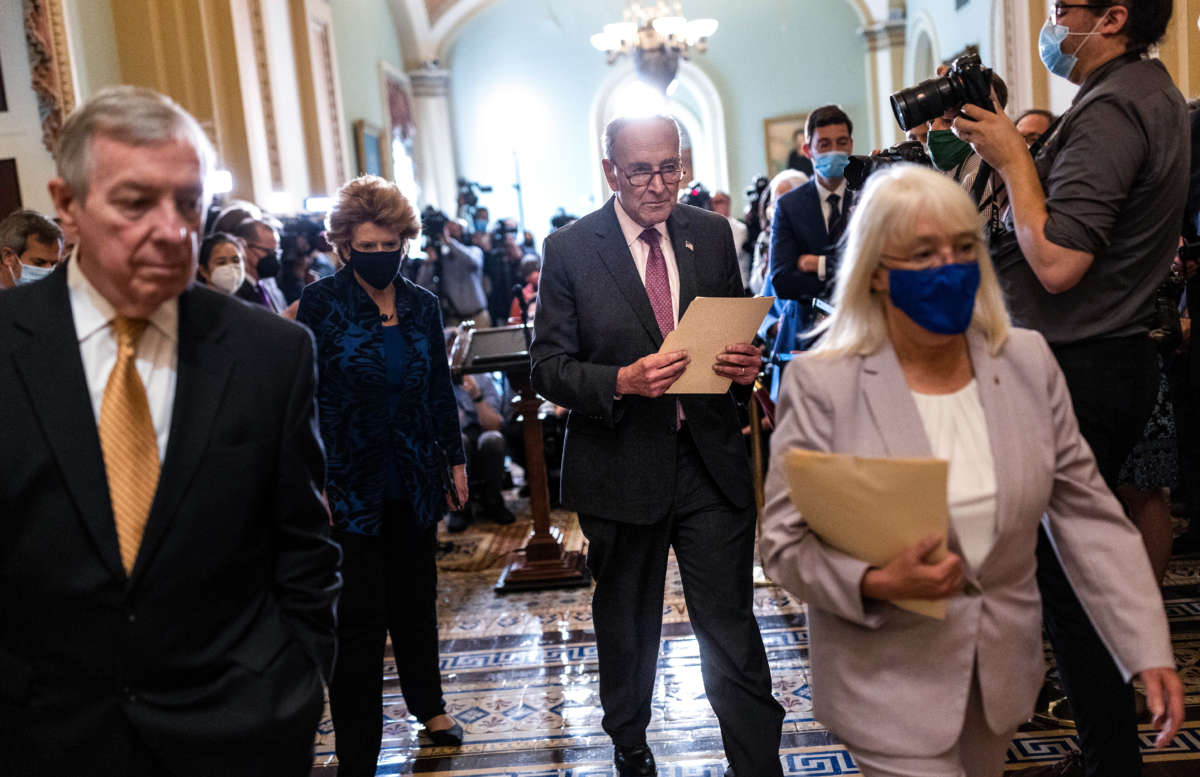On Wednesday evening, Senate Majority Leader Chuck Schumer (D-New York) announced that Democrats and Republicans in the Senate had reached a deal to avert a government shutdown this week.
On Monday, Republicans blocked efforts to fund the government beyond the midnight deadline on Friday morning. Without a continuing resolution to produce more funds, there was the possibility of a government shutdown, which would have resulted in the sudden halting of a number of federal services for an indeterminate amount of time.
Schumer announced that Republicans had agreed not to block a new vote on the measure, set to come sometime midday on Thursday — hours before the deadline would have been reached.
“We have an agreement on the CR — the continuing resolution to prevent a government shutdown — and we should be voting on that tomorrow morning,” Schumer said on Wednesday night.
The resolution is set to keep the government open through at least December 3. It will include funding for emergency services, such as disaster relief, as well as funding for the resettlement of Afghan refugees.
Upon passage, the bill will likely be voted upon and passed in the House of Representatives later that day, and signed into law by President Joe Biden.
The agreement on the continuing resolution is a significant development, as it will avert a crisis that would have started this week. One analysis found that as many as 6 million jobs could have been lost if government funding wasn’t continued on Thursday.
Although the measure addresses how the government will be funded for the next two months, it does not resolve the raising of the debt ceiling. The U.S. is set to default on its debt obligations around October 18 if nothing changes in the immediate future, a situation that could come with serious economic repercussions.
Defaulting on the debt could mean the U.S.’s ability to borrow money will be negatively impacted. In 2011, the mere possibility of default led to the nation’s credit rating being downgraded by Standard & Poor’s for the first time in 70 years.
Failing to adjust the debt ceiling wouldn’t just affect the government’s credit rating — it would also have rippling effects on the rest of the country, and could cause a recession that would damage an already weakened economy.
“It would only take a couple of months of missing federal payments due to the debt ceiling to mechanically send the economy into recession — and that’s without assessing damage it would cause from financial market fallouts,” an assessment from the Economic Policy Institute warned.
Some lawmakers believe that Congress should no longer have the responsibility of managing fiscal crises. On Thursday morning, Rep. Brendan Boyle (D-Pennsylvania) tweeted that legislation he proposed with Rep. John Yarmuth (D-Kentucky) could ensure that debt limits would never be a political issue to be debated on again.
This artificial crisis is COMPLETELY avoidable,” Boyle tweeted. “The Debt Ceiling Reform Act that @RepJohnYarmuth and I introduced [Wednesday] would fix this problem.”
According to a press release from Boyle, the proposed bill “would eliminate the debt limit as we now know it” and would transfer the authority to raise the debt ceiling to the Treasury Department.
Join us in defending the truth before it’s too late
The future of independent journalism is uncertain, and the consequences of losing it are too grave to ignore. To ensure Truthout remains safe, strong, and free, we need to raise $29,000 in the next 36 hours. Every dollar raised goes directly toward the costs of producing news you can trust.
Please give what you can — because by supporting us with a tax-deductible donation, you’re not just preserving a source of news, you’re helping to safeguard what’s left of our democracy.
